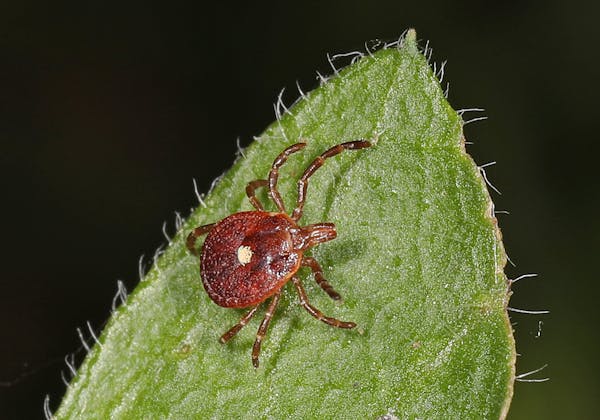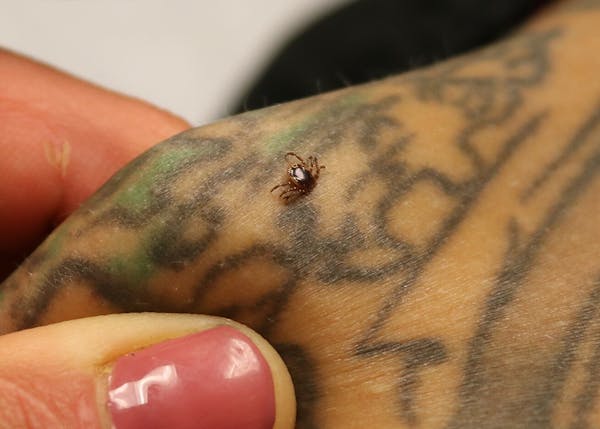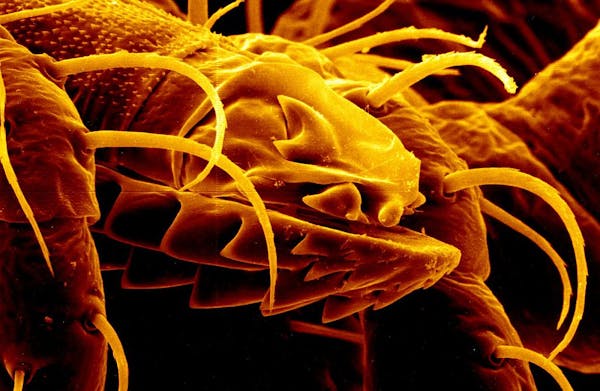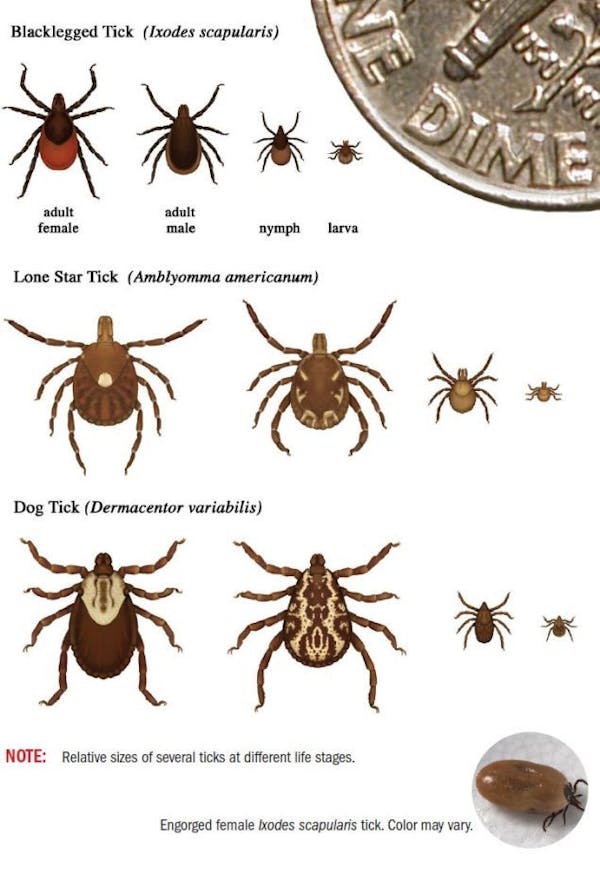
Posted on 08/05/2025 1:04:09 PM PDT by Red Badger
Hours after savoring that perfectly grilled steak on a beautiful summer evening, your body turns traitor, declaring war on the very meal you just enjoyed. You begin to feel excruciating itchiness, pain or even swelling that can escalate to the point of requiring emergency care.
The culprit isn’t food poisoning – it’s the fallout from a tick bite you may have gotten months earlier and didn’t even notice.
This delayed allergic reaction is called alpha-gal syndrome. While it’s commonly called the “red meat allergy,” that nickname is misleading, because alpha-gal syndrome can cause strong reactions to many products, beyond just red meat.
The syndrome is also rapidly spreading in the U.S. and around the globe. The Centers for Disease Control and Prevention estimates as many as 450,000 people in the U.S. may have it. And it’s carried by many more tick species than most people realize.

Cases of suspected alpha-gal syndrome based on confirmed laboratory evidence. CDC
What is alpha-gal syndrome?
Alpha-gal syndrome is actually an allergy to a sugar molecule with a tongue-twisting name: galactose-alpha-1,3-galactose, shortened to alpha-gal.
The alpha-gal sugar molecule exists in the tissues of most mammals, including cows, pigs, deer and rabbits. But it’s absent in humans. When a big dose of alpha-gal gets into your bloodstream through a tick bite, it can send your immune system into overdrive to generate antibodies against alpha-gal. In later exposure to foods containing alpha-gal, your immune system might then launch an inappropriate allergic response.

A lone star tick (Amblyomma americanum) found near Aden, Va. The tick can cause alpha-gal syndrome as well as carry other diseases, including ehrlichiosis, tularemia and Southern tick-associated rash illness. Judy Gallagher via Wikimedia, CC BY
Often this allergy is triggered by eating red meat. But the allergy also can be set off by exposure to a range of other animal-based products, including dairy products, gelatin (think Jell-O or gummy bears), medications and even some personal care items. The drug heparin, used to prevent blood clotting during surgery, is extracted from pig intestines, and its use has triggered a dangerous reaction in some people with alpha-gal syndrome.
Once you have alpha-gal syndrome, it’s possible to get over the allergy if you can modify your diet enough to avoid triggering another reaction for a few years and also avoid more tick bites. But that takes time and careful attention to the less obvious triggers that you might be exposed to.
Why more people are being diagnosed
As an entomologist who studies bugs and the diseases they transmit, what I find alarming is how rapidly this allergy is spreading around the globe.
Several years ago, experts thought alpha-gal syndrome was primarily limited to the southeastern U.S. because it was largely associated with the geographical range of the lone star tick.

How a tick feeds. National Institute of Allergy and Infectious Diseases via Wikimedia Commons, CC BY
However, both local and global reports have now identified many different tick species across six continents that are capable of causing alpha-gal syndrome, including the prolific black-legged tick, or deer tick, which also transmits Lyme disease.
These ticks lurk in yards and urban parks, as well as forests where they can stealthily grab onto hikers when they touch tick-infested vegetation. As tick populations boom with growing deer and human populations, the number of people with alpha-gal syndrome is escalating.
Why ticks are blamed for alpha-gal syndrome
There are a few theories on how a tick bite triggers alpha-gal syndrome and why only a small proportion of people bitten develop the allergy. To understand the theories, it helps to understand what happens as a tick starts feeding on you.
When a tick finds you, it typically looks for a warm, dark area to hide and attach itself to your body. Then its serrated teeth chew through your skin with rapid sawing motions.
As it excavates deeper into your skin, the tick deploys a barbed feeding tube, like a miniature drilling rig, and it secretes a biological cement that anchors its head into its new tunnel.

A tick’s mouth is barbed so it can stay embedded in your skin as it draws blood over hours and sometimes days. National Institute of Allergy and Infectious Diseases
=======================================================================
Once secure, the tick activates its pumping station, injecting copious amounts of saliva containing anesthetics, blood thinners and, sometimes, alpha-gal sugars into the wound so it can feed undetected, sometimes for days.
One theory about how a tick bite causes alpha-gal syndrome is linked to the enormous quantity of tick saliva released during feeding, which activates the body’s strong immune response. Another suggests how the skin is damaged as the tick feeds and the possible effect of the tick’s regurgitated stomach contents into the bite site are to blame. Or it may be a combination of these and other triggers. Scientists are still investigating the causes.
What an allergic reaction feels like
The allergy doesn’t begin right away. Typically, one to three months after the sensitizing tick bite, a person with alpha-gal syndrome has their first, disturbing reaction.
Alpha-gal syndrome produces symptoms that range from hives or swelling to crushing abdominal pain, violent nausea or even life-threatening anaphylactic shock. The symptoms usually start two to six hours after a person has ingested a meat product containing alpha-gal.
Due to a general lack of awareness about the allergy, however, doctors can easily miss the diagnosis. A study in 2022 found that 42% of U.S. health care practitioners had never heard of alpha-gal syndrome. A decade ago, people with alpha-gal syndrome might go years before the cause of their symptoms was accurately diagnosed. Today, the diagnosis is faster in areas where doctors are familiar with the syndrome, but in many parts of the country it can still take time and multiple doctor visits.
Unfortunately, with every additional tick bite or exposure to food or products containing alpha-gal, the allergy can increase in severity.

The lone star tick isn’t the only one that can cause alpha-gal syndrome. Black-legged ticks have also been connected to cases. U.S. Army
If you think you have alpha-gal syndrome
If you suspect you may have alpha-gal syndrome, the first step is to discuss the possibility with your doctor and ask them to order a simple blood test to measure whether your immune system is reacting to alpha-gal.
If you test positive, the main strategy for managing the allergy is to avoid eating any food product from a mammal, including milk and cheese, as well as other potential triggers, such as more tick bites.
Read labels carefully. Some products contain additives such as carrageenan, which is derived from red algae and contains alpha-gal.
In extreme cases, people with alpha-gal syndrome may need to carry an EpiPen to prevent anaphylactic shock. Reputable websites, such as the CDC and alphagalinformation.org, can provide more information and advice.
Mysteries remain as alpha-gal syndrome spreads
Since alpha-gal syndrome was first formally documented in the early 2000s, scientists have made progress in understanding this puzzling condition. Researchers have connected the allergy to specific tick bites and found that people with the allergy can have a higher risk of heart disease, even without allergy symptoms.
But important mysteries remain.
Scientists are still figuring out exactly how the tick bite tricks the human immune system and why tick saliva is a trigger for only some people. With growing public interest in alpha-gal syndrome, the next decade could bring breakthroughs in preventing, diagnosing and treating this condition.
For now, the next time you are strolling in the woods or in long grasses, remember to check for ticks on your body, wear long sleeves, long pants and tick repellent to protect yourself from these bloodthirsty hitchhikers. If you do get bitten by a tick, watch out for odd allergic symptoms to appear a few hours after your next steak or handful of gummy bears.
Ping!...................
My.students are always completely baffled when we go afield in Oklahoma, Mississippi or New York State that I am head to toe covered in long sleeves and using olive drab Vietnam era leg and wrist ties the jingle warfare ones originally designed to keep ticks and leeches out of your greens. Then coated in 100% DEET and 40% DEET on all exposed skin.
Yup alpha-gal my mother in law was this from an unknown source and it’s miserable for her. Having seen it first hand my field methods are not even close to over kill. Every other student except for the vegans who say good all DEET up and wear long cloths even in 100 degree heat. PFG gear for the win there.

https://x.com/libsoftiktok/status/1949954274223419715
I’m surprised radical vegans haven’t been planting these ticks in all 50 states. It’s a vegan’s dream to make all normal people unable to eat meat.
Eat Garlic feed them Garlic. Garlic keeps the Blood suckers away.
Bill Gates is probably breeding and releasing the Ticks
Ticks as well as mosquitoes have a history of being researched/used as biological weapons. Germany, Japan, and all the usual suspects have at least toyed with the idea.
Possums and free-range chickens love to feast on ticks.
For anyone who may not know, opossums eat thousands of ticks everyday. So next time you encounter one crossing the road at night, try not to hit it.
” When a big dose of alpha-gal gets into your bloodstream through a tick bite, it can send your immune system into overdrive to generate antibodies against alpha-gal. In later exposure to foods containing alpha-gal, your immune system might then launch an inappropriate allergic response. “
Will the CDC cross reference the vaxx/boosters to the incidence and increase of alpha-gal syndrome?
Disclosure, my daughter was diagnosed with alpha-gal about a year after her last vaxx-booster.
Biological warfare researchers have been work with ticks and various diseases since WW II well documented in the book Bitten.
Woah!!
I guess I don’t have Alpha gal allergy.
Gates?
Sounds like something Bill Gates had a hand in.
We have a friend who has this condition, and I am always forgetting whether it’s red meat or white meat he can’t have.
Have it. Picked it up from a tick bite in Georgia. Took almost five years to be able to come close to eating red meat again, but I can only deal with a piece about as big as a deck of cards a week. More than that, and it’s off the hospital I go. Chicken, pork, seafood... everything else is fine. Of course, what do I want: RED MEAT!!! Could be worse: doc told me I could have been allergic to bacon. lol
Usually have to stick to Beyond/Impossible stuff which sucks compared to the real thing, but it at least reminds me of what I’m missing.
Our friend at church had a tick bite about three years ago. He can’t have red meat or any dairy. He gets tested every year to see if the allergy has passed but, so far, no luck.
Bathing helps... Take a shower every now and then, and if you see a tic... Pull it out. Problem solved.
Disclaimer: Opinions posted on Free Republic are those of the individual posters and do not necessarily represent the opinion of Free Republic or its management. All materials posted herein are protected by copyright law and the exemption for fair use of copyrighted works.